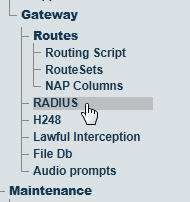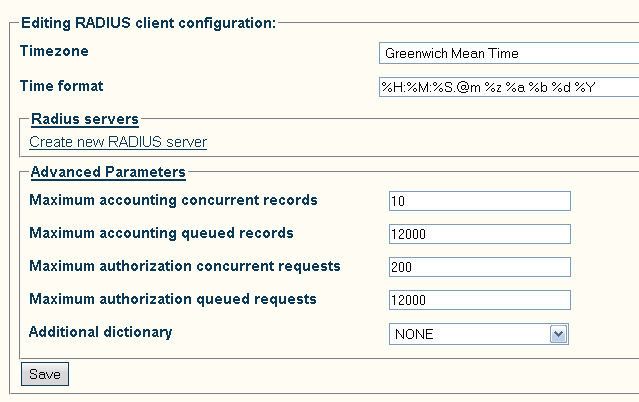Toolpack:Configuring RADIUS client B
From TBwiki
(Difference between revisions)
(Added RADIUS client for Toolpack 2.7) |
|||
| (3 intermediate revisions by 2 users not shown) | |||
| Line 1: | Line 1: | ||
=== '''''Applies to version(s): v2.7''''' === | === '''''Applies to version(s): v2.7''''' === | ||
| − | {{DISPLAYTITLE | + | {{DISPLAYTITLE:Configuring RADIUS}} |
| − | This | + | This article describes how to configure a TMG system to communicate with RADIUS servers. RADIUS requests will be sent from the TMG management port (mgmt0) or from the [[Virtual IP Interfaces|Virtual IP Interfaces]] (if they are configured). |
| Line 9: | Line 9: | ||
| − | 2- | + | 2- The '''Editing RADIUS client configuration''' page provides some general parameters that can be modified: |
*'''Timezone''' will use the local timezone or the GMT timezone in the RADIUS attributes | *'''Timezone''' will use the local timezone or the GMT timezone in the RADIUS attributes | ||
*'''Time format''' describes how to display the time in human readable format in the RADIUS attributes. This is based on the [http://php.net/manual/en/function.strftime.php strftime function] | *'''Time format''' describes how to display the time in human readable format in the RADIUS attributes. This is based on the [http://php.net/manual/en/function.strftime.php strftime function] | ||
| Line 17: | Line 17: | ||
**'''Maximum authorization concurrent requests''' is the maximum number of simultaneous authorization requests to be sent to the RADIUS servers. This improves the RADIUS performance of the system: it allows the RADIUS client to deal with servers that have high latency relative to the number of request/responses per second to be achieved. Default value is 200 requests. | **'''Maximum authorization concurrent requests''' is the maximum number of simultaneous authorization requests to be sent to the RADIUS servers. This improves the RADIUS performance of the system: it allows the RADIUS client to deal with servers that have high latency relative to the number of request/responses per second to be achieved. Default value is 200 requests. | ||
**'''Maximum authorization queued requests''' is the maximum number of authorization requests to queue when the maximum number of pending requests has been reached. When the maximum number of queued messages is reached, authorization requests will be dropped. Default value is 12000 requests. | **'''Maximum authorization queued requests''' is the maximum number of authorization requests to queue when the maximum number of pending requests has been reached. When the maximum number of queued messages is reached, authorization requests will be dropped. Default value is 12000 requests. | ||
| − | |||
**'''Additional dictionary''' is an additional dictionary that provides the definition of custom RADIUS attributes. | **'''Additional dictionary''' is an additional dictionary that provides the definition of custom RADIUS attributes. | ||
| + | ** Click '''Save''' to save your changes. | ||
[[Image:RADIUS-client-config-2_7.PNG|border]] | [[Image:RADIUS-client-config-2_7.PNG|border]] | ||
Latest revision as of 11:52, 12 March 2013
Applies to version(s): v2.7
This article describes how to configure a TMG system to communicate with RADIUS servers. RADIUS requests will be sent from the TMG management port (mgmt0) or from the Virtual IP Interfaces (if they are configured).
1- Select RADIUS from the navigation panel.
2- The Editing RADIUS client configuration page provides some general parameters that can be modified:
- Timezone will use the local timezone or the GMT timezone in the RADIUS attributes
- Time format describes how to display the time in human readable format in the RADIUS attributes. This is based on the strftime function
- In Advanced Parameters you have:
- Maximum accounting concurrent records is the maximum number of simultaneous accounting records to be sent to the RADIUS servers. This improves the RADIUS performance of the system: it allows the RADIUS client to deal with servers that have high latency relative to the number of request/responses per second to be achieved. Default value is 10 records.
- Maximum accounting queued records is the maximum number of accounting records to queue when the maximum number of pending records has been reached. When the maximum number of queued messages is reached, CDR records will be dropped. To prevent this, make sure the system supports CDR redundancy. Default value is 12000 records.
- Maximum authorization concurrent requests is the maximum number of simultaneous authorization requests to be sent to the RADIUS servers. This improves the RADIUS performance of the system: it allows the RADIUS client to deal with servers that have high latency relative to the number of request/responses per second to be achieved. Default value is 200 requests.
- Maximum authorization queued requests is the maximum number of authorization requests to queue when the maximum number of pending requests has been reached. When the maximum number of queued messages is reached, authorization requests will be dropped. Default value is 12000 requests.
- Additional dictionary is an additional dictionary that provides the definition of custom RADIUS attributes.
- Click Save to save your changes.

